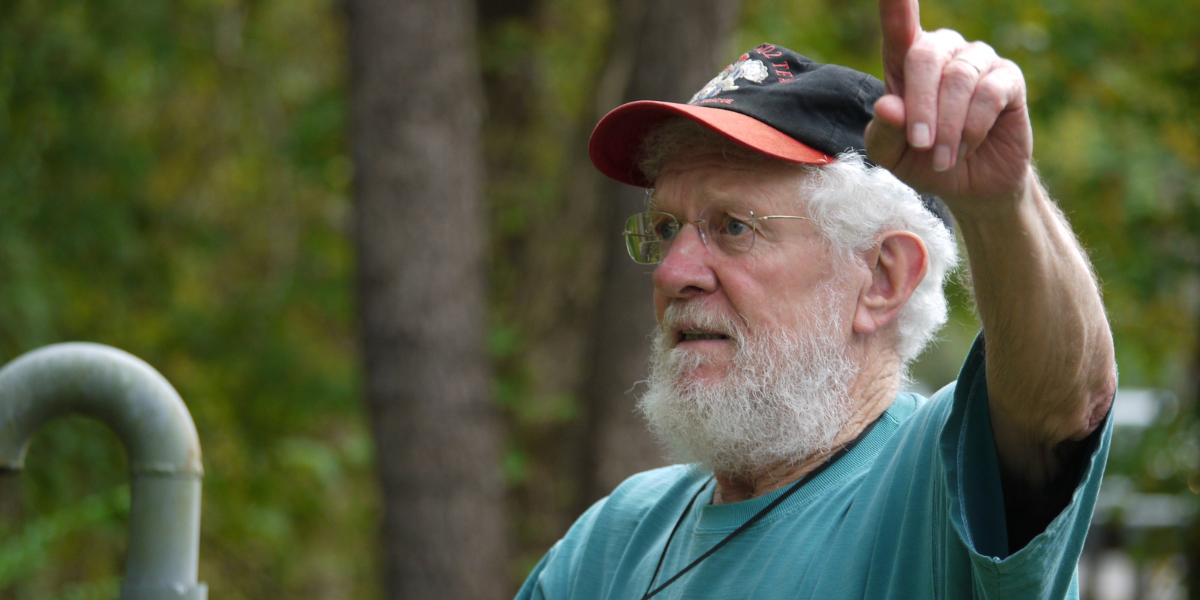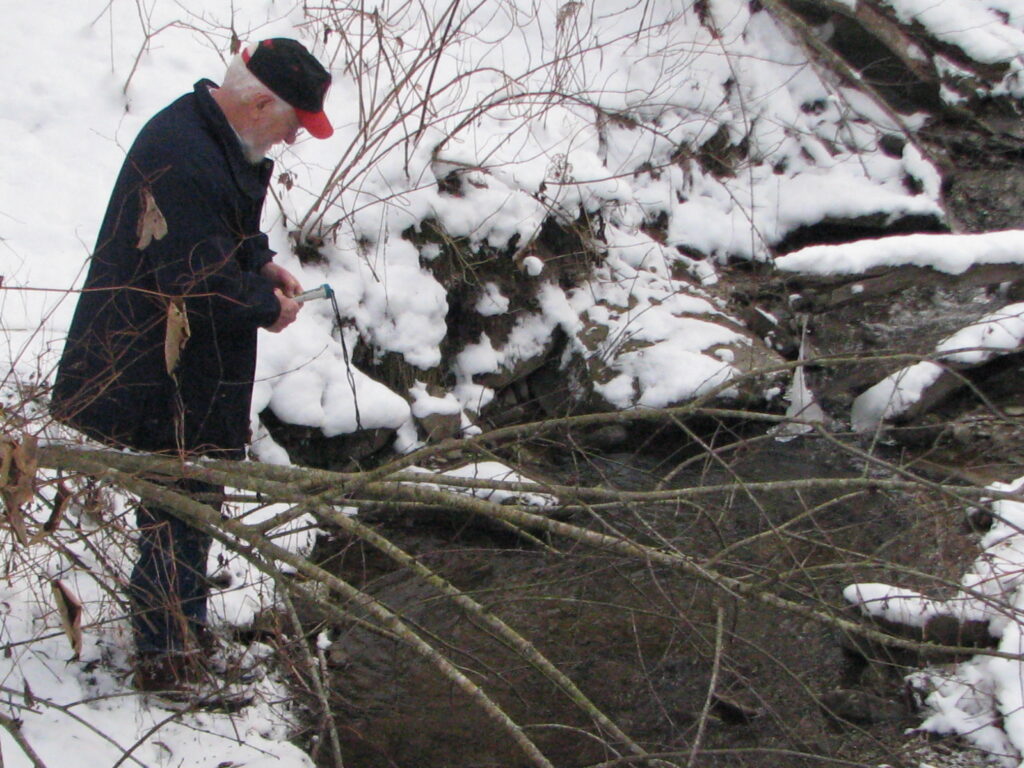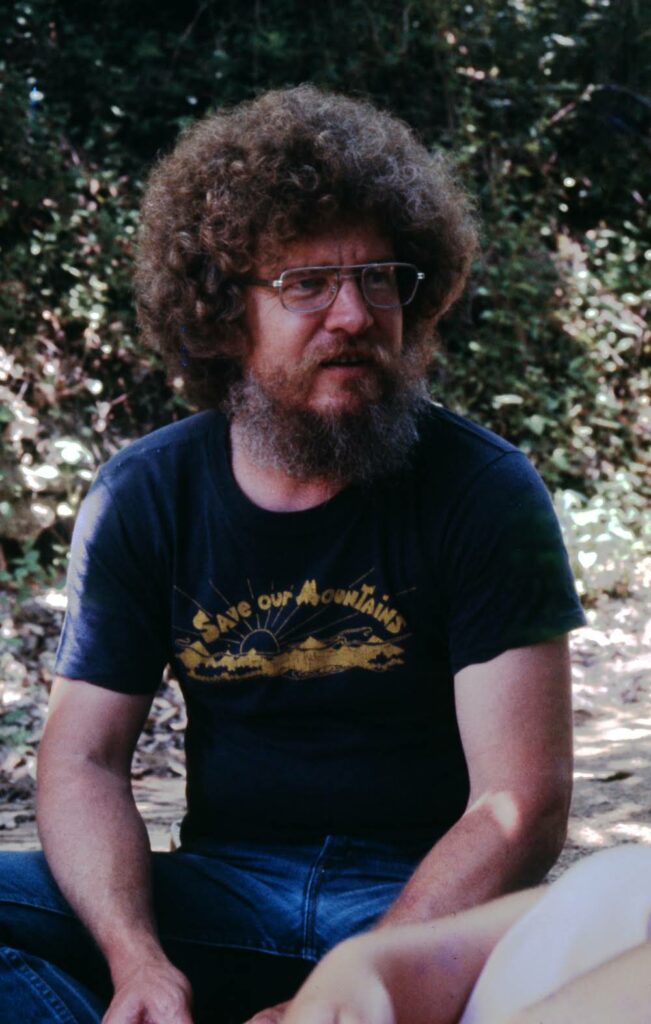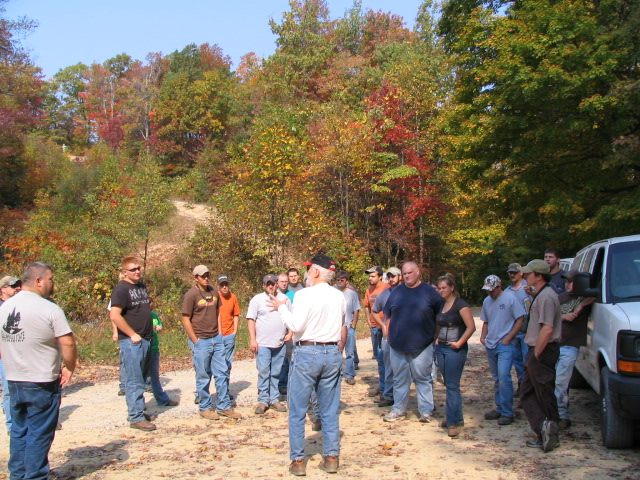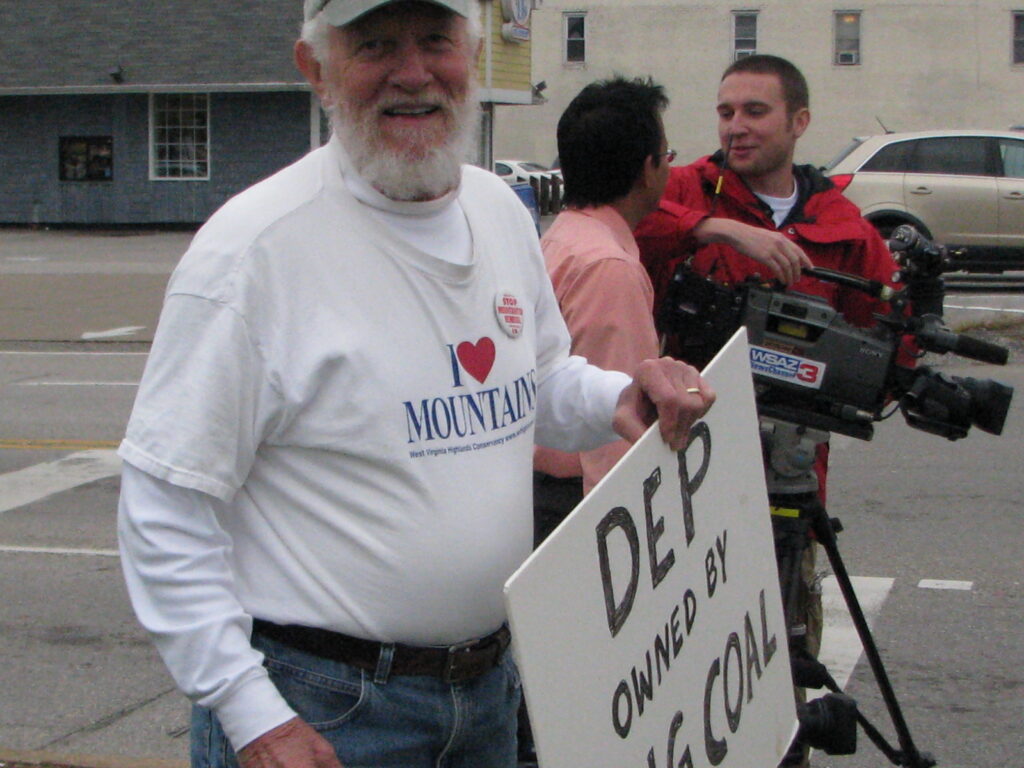The West Virginia Highlands Conservancy is mourning the loss of our longtime friend and board member Julian Martin, who recently passed away on March 24. In tribute, we present this collection of words of praises, a bit of biography and some of his own words.
Julian served on the boards of the Conservancy, the Kanawha State Forest Foundation, the West Virginia Labor History Association and the West Virginia Environmental Education Association. In retirement, Julian Martin was active in the efforts to stop the destruction of mountain top removal mining in his beloved Appalachian Mountains.
He was recognized as the West Virginia Environmental Council’s Grassroots Organizer of the Year, earned a plaque for Outstanding Achievement in Environmental Education, and was honored as a Red Bandana recipient by the West Virginia Mine Wars Museum.
His family lived in the Coal River Valley for eight generations; his father and grandfather were miners and his grandfather fought at Blair Mountain.
Soon after completing a degree in chemical engineering at West Virginia University, he became West Virginia’s first Peace Corps volunteer and served as a teacher in Nigeria.
He taught at Duval High School in Lincoln County from 1977-1998, where he was the union [WVEA] building representative. He practiced student centered, hands-on classroom activities.
On his first day of retirement, he and his wife, Mae Ellen Wilson traveled throughout the state taking ‘Save Blackwater Canyon’ petitions to fairs and festivals. With other volunteers, they collected 20,000 signatures. In 1999, he and Larry Gibson walked across West Virginia carrying signs against mountaintop removal. They met with media in towns along the way to get our issue publicized.
For more than twenty years he assisted the West Virginia Highlands Conservancy, as a lobbyist, board member, Vice President of State Affairs, and chair of the Speakers Bureau. Perhaps his most significant contribution was as Outreach Chair, where his “I ♥ Mountains” bumper stickers, hats, and shirts generated a new interest in preservation of the natural treasures here.
TRIBUTES
Julian spent decades as a teacher and mentor. There were a tremendous number of comments online from his students and fellow teachers. While difficult to condense, here are snippets of the sentiments:
Other tributes poured in, too; here are more.
“I don’t know how many times Julian and I travelled together to southern West Virginia to visit some of our favorite people and favorites spots. On our travels, we always had our stream testing kits handy, and we were far-too-often flabbergasted at the destruction of mountaintop removal operations on communities and the mountains, and the level of pollution our conductivity meters revealed downstream from valley fills.
Despite the brutal weight of what the coal industry was doing to the land and people, and despite the toll organizing against this insane method of coal mining reaped on individuals and groups, Julian always brought some good yarns and light and laughter to those hanging out with him. Sometimes, travelling together, we would get inordinately silly, and we could get outright giddy when we were in the environs of Julian, West Virginia. Then, we would threaten to visit Vivian, West Virginia, together, though we never made it there.
Julian helped me understand that you could be serious and fierce in combatting injustices, and also be loving and have fun in that work. I know he sparked fun, fierce and effective activism in so many others, and that is an amazing legacy.”
– Vivian Stockman
“I met Julian in 1966 when I was 14 years old because my mom got us involved as a host family for foreign students at West Virginia University. At that time Julian was the West Virginia University Foreign Student Adviser. That experience of meeting all those students from all over the world was only the first of many life-changing and mind-altering experiences which would happen after Julian came into our lives. I wish more people would have had a Julian in their life.” – Mike Breiding
“Julian was an extraordinary human being. Celebrating his life on Earth Day is SO appropriate for a man who did stream surveys and gave surface mining tours of Kayford Mountain even when he needed a cane to walk! His brilliant mind, dry humor, and warm heart made him a treasured friend and courageous warrior for peace, justice, education and conservation in a state and world that needed him in every way.”
– Barbara Frierson
“Julian was one of the most beautiful people I ever knew. He was a fire that lit truth to the evil of mountain top removal.”
– Bo Webb
“… Julian was my husband James’s mentor. James was one of the first interns for the Highlands Conservancy and Julian took him under his wing. James went on to fight mountaintop removal by monitoring streams and providing standing in over 15 court cases against coal companies.”
-Susan Tawney
“[Julian]… was my neighbor and first client as an editor for his Peace Corps memoir. He was a brilliant, kind, empathetic man. I will never forget seeing him walk down Longridge Road out of the literal mist, huge walking sticks in either hand, being heard before he was seen. He was a beautiful person.”
– Elizabeth Damewood Gaucher
“Julian was very loved and will be a huge loss. My husband and I often joined him in his activism and loved being in his company. We still laugh at some of the things he said to his unprepared ‘opponents!’ He was simply wonderful.”
– Tammy Medley Arthur-Sublette
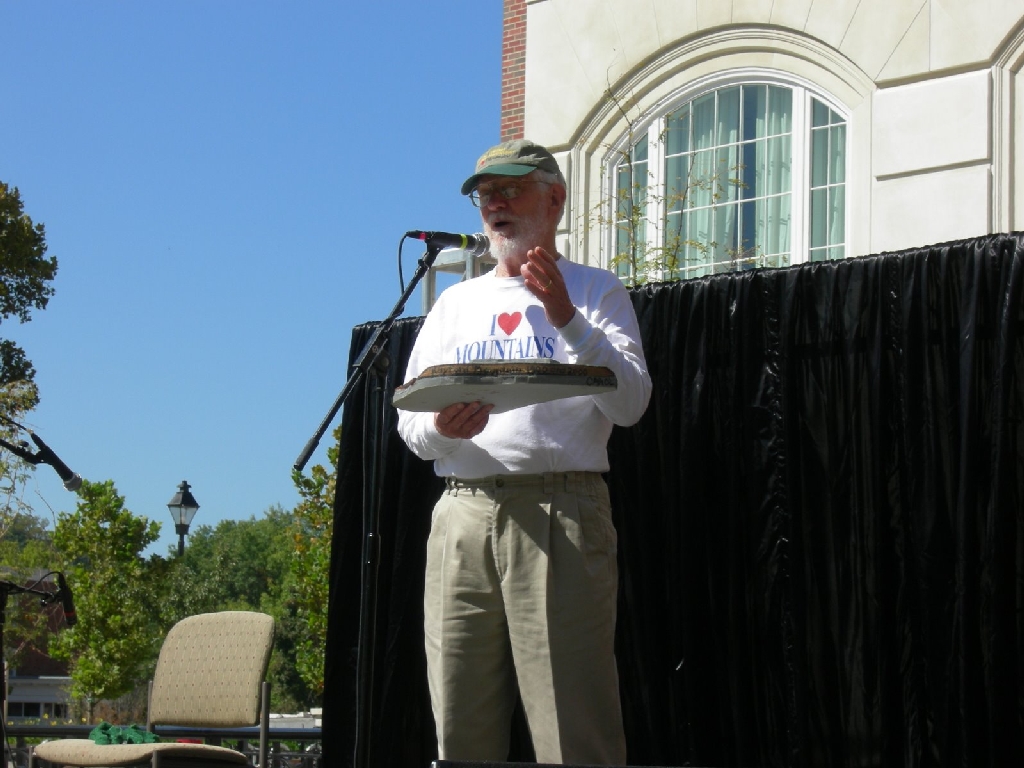
“I have known Julian for years, serving on the board of the West Virginia Labor History Association with him. I read both of his outstanding books about serving in the Peace Corp. he was a truly intelligent, kind person who greatly helped the people of Appalachia. We will miss him forever.”
– Steve Fesenmaier
“Julian was a dear man and a frontline fighter for justice, doing the right thing and fearlessly confronting The Man. He personally inspired me with forthright willingness to speak the truth and damn the consequences. May he rest in peace and power.”
– Douglas John Imbrogno
“… appreciated having… [him] in my life and as an influence on my work. Very sorry to hear that Julian Martin has passed. Learned a lot from him. He demanded a lot of journalists, especially when it came to covering mountaintop removal. But that made me better at it in the end. He was a master teacher and for sure was never boring…”
– Ken Ward Jr.
“Julian was such a committed person. He was inspiring and worked hard. And was one of the most interesting conversationalists I ever had the pleasure of a long road trip with! We will miss you, dear man! Fight for us from the other side!”
– Carol Warren
“Condolences to the family and many friends of Julian Martin. He was a staunch defender of the Appalachian Mountains, never hesitating to speak out against the injustices imposed by coal companies and their enablers. Here’s a video where he gives the West Virginia Department of Environmental Protection a good talking to, about 3:45 into the video. He will be missed.”
-Vernon Haltom
“I looked up to Julian a lot. He was an excellent, compelling public speaker and came to speak at several Mountain Justice events. He made us laugh and rage over the idiocy of blowing up West Virginia’s most precious asset, its mountains. I recall one time we were in Washington, D.C., lobbying Senator Rockefeller’s staff about mountaintop removal, which his aide called ‘mountaintop mining’ the euphemism used at that time. Julian’s face got red and he demanded that the aide call it mountaintop removal. I also remember when Julian and I did some speaking gigs together on the mountaintop removal road show. This would have been around 2008 or so. He came to Lexington so I took him hiking in the Red River Gorge to Grays Arch, a popular spot. While we were admiring the arch, some other hikers walked up, and Julian greeted them and began telling them about mountaintop removal! Never missing a chance. Goodbye Julian, you were loved and admired by many, many people.”
– Dave Cooper
“His [passing] is a tremendous loss to all those that knew him. His was a powerful voice for truth and dignity. I always felt inspired and reinvigorated after our talks.”
– Shirley Stewart Burns
“Julian was a force of nature.”
– Denise Giardina
“From Julia Bonds I learned to be angry. Get things done. From Larry Gibson I learned just get out there and make people look. From Julian we learned to think about our surrounding environment and people. One of the great influences in our entire movement. And thank you Ken for the years you spent covering him.”
– Ágúst Guðlaugur Guðmundsson
“Julian helped me get my first job after grad school. We folded letters at West Virginia Environmental Council and then I got a job at CAG. He was a great story teller and friend. He will be missed.”
– Ted Boettner
“Very sad to hear of the passing of Julian Martin. He was always a fierce and strong advocate for the mountains.”
– Annie Jane Cotton
“I met Julian Martin when I joined the Board of Directors of the West Virginia Highlands Conservancy. He was the man behind the “I Love Mountains” tee shirts, bumper stickers, and hats. That campaign was so successful the board saw fit to copy right the slogan and sales items. That alone helped raise funds for our battles on behalf of the West Virginia mountains.
More than that, for years Julian was the tireless outreach person, manning tables to highlight our work. He was a constant foe of the destructive mountaintop removal mining technique involving bulldozing the overburden into adjacent valleys to expose coal seams that were then mined without having to tunnel into the coal.
Along with the late Larry Gibson, a close friend, Julian walked many miles carrying banners protesting mountaintop removal. One day the two of them took me to view a mountaintop removal mine. It made me sick to see the vast wasteland left behind. It was not an enjoyable afternoon, but it was certainly educational. Two better teachers could not have been found.
Throughout all of this over many years, Julian kept a well-honed sense of humor. During his service on the board, it was Julian who made the motion to adjourn. He hated long meetings. It was a matter of parliamentary procedure that board members would wait for Julian to make his motion and then second it.
Julian stepped down from the board years before me. It seemed to me there was a hole at the board table. I sometimes wondered as matters were debated around the table, what would Julian think? What would he say? His wisdom and sometimes cantankerous remarks were prized elements of board meetings. I missed him.
The day came when I followed Julian in stepping down from the board. From time to time someone would post something about him on our message board. Those notes grew fewer with the passage of time.
Julian’s body of work, meanwhile, has been picked up by newer board members. Some never knew him. Yet, it is the nature of environmental activism than someone must carry on the work. Julian’s legacy lies mostly in his efforts, but also in paving the way for others to carry on. He taught us well. Those of us still working to protect the mountains of West Virginia can look to his example for inspiration.”
– George Beetham
HIS WRITING
Julian loved words and was a prolific writer. We in the Conservancy benefitted immensely from his contributions to The Highlands Voice. He published several books, including Imagonna: Peace Corps Memories, Sarvice Mountain, and The Soviet Union and Lincoln County USA. He blogged with The News from Sam’s Branch which you can visit at https://julianweldonmartin.us
From a piece in The Highlands Voice, Blood Money, he wrote:
“A couple of years ago at the Putnam County Fair, a mountaintop removal miner gladly signed the Save Blackwater Canyon petition I offered and then told me about his job. “At the end of the day I look at the destruction and feel like I am taking blood money,” he told me.”
In another article, 1884 Tax Commission Report…
“Every mountain that is destroyed will give us some temporary electrical pleasure and the mountain will then be gone forever. They can’t put it back anywhere near what it was and they definitely can’t make it better than it was.”
Finally, and fittingly, here is a quote from our own book, “Fighting to Protect the Highlands; the First Forty Years of the West Virginia Highlands Conservancy,” by David P. Elkinton.
“More than one friend has asked me if I think we can win these environmental battles. They point out the incredible odds, the mountains of cash put into destroying our mountains, buying our politicians and the false twists and spins the industry executives and public relations companies put on the facts.
My answer to the question can we win in the struggle to save our environment is that I don’t know if we can win or not. I know that I am going to die but I don’t quit living. I also know that we could lose out on some of our efforts to preserve nature [ourselves included] but that doesn’t mean we should stop trying. We have to speak the truth whether it prevails or not. It would be bad enough to lose, but still worse to lose without speaking the truth.”

